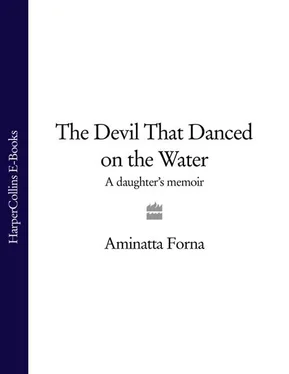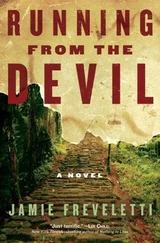When I heard my stepmother and brother come back, I started up from the table. The sound of their footsteps was on the stairs.
‘July the fourth,’ said Sheka. He was still breathless. ‘He’s going to come on July the fourth now!’ What the reason was for the delay nobody suggested. I thought he would be here, with us that very day. But I didn’t feel disappointed. Instead I felt this was how it should be: time to prepare after so many years. I left the dining room.
The huge staircase dipped away below me and the carpeted stairs swung round in a lush sweep. I put a hand on the banister, feeling the cool, varnished wood, one foot out onto the first step, and I began to walk down the stairs. My family were crowded around behind me. I could hear the rustling and feel them jogging each other. What on earth were they all doing?
As I turned the arc of the stairs I understood. The bearded figure standing in the hallway at the bottom wore a tan, short-sleeved suit, despite the cold. He had on polished brown shoes and a gold watch and although he was talking on the telephone with his back half turned towards me, I recognised him in that instant. I could still hear their voices behind me as I hurled myself down the stairs. He hadn’t seen me yet and I felt like a child again, my legs moving in great, galloping strides as I threw myself towards him. In that moment he turned round, smiling with surprise, and caught me in his one free arm.
‘Hey, hey. What’s all this?’ he said, as though I really was an overexcited ten-year-old. But I didn’t care. I put my arms around him and hugged him. I could feel everyone gathered around behind me. My face was against his shoulder and I squeezed my eyes shut.
When I opened them again the pale, grey London dawn had cast a triangle of light on the wooden floor. I could see the shadows of my clothes hanging from the pegs on the back of the half-open door. The blinds were still closed. On the chair by my bedside the faint glow of the alarm clock lit the shapes of a pencil, paper, a lip balm, a book and a wooden box. The sheet below me was wrinkled, cold with sweat.
Once a year, twice at the very most, the dreams had grown fewer as the decades passed. Sometimes I dreamed he came back from living in a far away country, that he had been looking for us, but couldn’t find us. Other times I dreamed that he had been in hiding and everyone around him sworn to secrecy. I’m sorry, Am, he’d say with a smile. We wanted to tell you sooner. Yes, the dreams came less frequently now, but despite the twenty-five years that had passed, they had never ceased entirely.
All my life I have harboured memories, tried to piece together scraps of truth and make sense of fragmented images. For as long as I can remember my world was one of parallel realities. There were the official truths versus my private memories, the propaganda of history books against untold stories; there were judgements and then there were facts, adult stances and the clarity of the child’s vision; their version, my version.
There were times, a summer holiday or a few months, when I lived my childhood as a seamless dream where time ebbed like the tide and there was nothing to break the rhythm. But for the most part that was not so. Over and over the delicate membrane of my sphere would be broken and I tumbled out of my cocoon into the outside world.
Afterwards no one explained. People imagined these were things children shouldn’t know, or they did not think we had a right to know. We were encouraged to forget, dissuaded from asking. Gradually I learned to spy: I eavesdropped on adult conversations, rifled hidden papers, devised lines of questioning and I began to build onto my fragments layers of truth. And as I did so I discovered how deep the lies went.
I grew older, became a journalist and made a living using the skills I spent my childhood honing. All the time I hoarded my recollections, guarding them carefully against the lies: lies that hardened, spread and became ever more entrenched.
Yet what use against the deceit of a state are the memories of a child?
In the African oral tradition great events and insignificant moments, the ordinary and the extraordinary, are notches on the same wheel. They exist in relation to each other. The little occurrences are as important as the grand designs: the threads are the texture of truth that separate man-made myth from fact. They are the testimonies; the words of history’s eyewitnesses.
I remember cockroaches.
The tiniest of tickles across my toes made me look down. Early morning and I stood alone, chin high to the bathroom sink, both taps running. The cockroach was standing next to me and his sweeping, chestnut antennae brushed my foot in a way that seemed remarkably intimate, as though he imagined we were friends. Glossy wings tucked flat across his back; legs angled outward below the armoured undercarriage; the jaws which dominated his minuscule head worked steadily like a toothless old man. I kept my foot still, one eye on my flat-backed companion, while I reached for the tooth mug. As fast as I could manage I up-ended the beaker, pulled my foot away and trapped the cockroach under the glass. It sat unperturbed, as at home as a fish in an aquarium.
By the end of the day there were half a dozen inverted objects on the floor around the house: two china cups in the sitting room; a plastic toy cooking pot and a second glass in the hallway; and in the bathroom a toilet roll with a wad of paper wedged into the top. They were put there by the three of us: my sister, my brother and me, and we waited for our father to come in. This was our daily routine. When he arrived he went round the house picking up each object and dispatching the creature beneath, while we followed behind gazing at him with a mixture of disgust and admiration.
You could hear the crack and crunch of the cockroach as its skeleton gave way underfoot, pale innards spurted out. We were in awe at the way this grotesque feature didn’t seem to bother our father, who would squash a cockroach with his bare feet. If you caught him at a particular time, when he was still in his pyjamas in the morning, say, and asked him to kill a cockroach for you, he would go right ahead and stamp on it with his naked feet.
My mother had a story about cockroaches that took place in the same house. We’d just moved up-country, where my parents planned to set up a clinic, the only one for hundreds of miles. For several months my father had scouted the regions looking for a suitable spot and finally settled on Koidu, three hundred miles to the east, right on the border with Guinea, in the heart of the diamond-mining region. He rented a rambling bungalow with several wings, set within its own compound, with the idea of turning one wing into a ward for in-patients and living in the others. My mother and we three children left our noisy, downtown flat in Freetown and flew to Koidu in a plane that bounced from town to town across the interior of the country, while my father drove up in our Austin with the dogs and the luggage.
When we arrived it was late into the night. My parents stacked our belongings in the main room and my mother set up cots for us in one of the bedrooms, camp beds for my father and herself in another. In the early hours of the morning, when it was still black, she awoke to the sound of my cries. She rose and came to me, turning on the lights as she passed through the house. She soothed me and returned me to my cot. Just as she was back in her bed and falling asleep again she heard me crying. This happened three times.
The fourth time she didn’t bother to turn on the lights. She paused at the door to my room and as she looked around she saw that the walls seemed to be moving. My mother decided that she must be exhausted or else still dreaming and lingered a while in the dark at the bedroom door. Yet beneath her gaze the entire room seemed to have lost density: ceiling, floor, walls, even my cot heaved. Her baby was still shrieking. She flicked the light switch. Nothing. Turned it off and waited. Slowly the walls turned fluid again. She ran to fetch her husband, who was still sleeping deeply on his camp bed. As they stood at the door of my room, she showed him what she had seen, flipping the lights on and off.
Читать дальше












